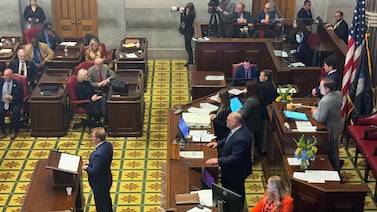Sign up for Chalkbeat New York’s free daily newsletter to keep up with NYC’s public schools.
After a Brooklyn school’s yearlong fight to be exempt from New York City’s sweeping reading curriculum mandate, officials have quietly granted their request.
The Brooklyn School of Inquiry, a K-8 gifted and talented program known as BSI, is the first school to win permission to sidestep Chancellor David Banks’ signature literacy initiative requiring all elementary schools use one of three city-approved reading curriculums.
The decision to grant a waiver comes at a crucial moment. Nearly half of the city’s 32 local school districts adopted new curriculums this school year, and all districts must follow suit by September. The move may prompt other school communities to clamor for an exemption.
But as city officials have not laid out clear criteria for exemptions, observers raised equity questions about the process, saying it may favor parents with the time and know-how to mobilize.
Banks has staked much of his education agenda on the idea that the city can improve literacy rates by mandating schools use a small number of vetted programs, as campuses across the city have long embraced popular curriculums that have been discredited. Many literacy experts and advocacy groups, including the city’s teachers union, support the effort.
Students and families from BSI, however, have repeatedly shown up at public meetings to critique their school’s new curriculum, created by the company Houghton Mifflin Harcourt. They even won an impromptu sit-down with top officials, including Dan Weisberg, the Education Department’s second-in-command, after testifying at a public meeting last month.
Instead of reading full books with discussions of theme and plot, the BSI students explained that they’re now focusing on shorter excerpts from a textbook followed by short-answer responses. The curriculum sapped their lessons of joy and rigor, they claimed. (A spokesperson for Houghton Mifflin Harcourt previously said the curriculum also includes opportunities to read full books.)
That advocacy paid off. An Education Department spokesperson confirmed the school was granted a waiver due to its high academic performance and is in the process of selecting a new program. About 90% of the school’s students in grades 3-8 are proficient in reading, according to state tests, about 40 points higher than the city average.
“This was very much about preserving and maintaining the unique progressive vision of this school, which we felt was threatened,” said Alina Lewis, a parent association member at BSI who helped spearhead the campaign for the exemption. “While it’s great that my kid can now read a book, every single kid in the city should be able to read rich literature.”
Houghton Mifflin Harcourt’s curriculum, Into Reading, is the most popular choice — required in 22 of the city’s 32 local districts. It has also faced the most criticism.
Parent leaders at schools beyond BSI worry that the new mandate may brush aside project-based philosophies or other teacher-created lessons that make their schools unique.
Lack of transparent exemption process raises equity concerns
Tensions about whether or not to offer waivers have been rising for months — and the Education Department has vacillated about how the process would work.
Officials initially said that only a small slice of schools with reading proficiency rates above 85% would be eligible, a threshold that Banks recently echoed. But even as students and parents pressed their case at BSI, the school’s superintendent didn’t appear to budge.
“There’s currently no process in place for an exception or a waiver,” District 20 Superintendent David Pretto said at a heated February education council meeting.
Last month, Education Department spokesperson Nicole Brownstein said some schools were under consideration for an exemption, but the schools ultimately decided to stick with the mandated reading programs. Brownstein did not answer questions about what prompted the reversal in BSI’s case nor did she say what specific criteria the city is using to determine eligibility for waivers.
The principal of BSI did not respond to a request for comment.
That lack of clarity around the criteria for waivers raised eyebrows among experts who worry that exemptions could simply go to better-resourced schools with more vocal parent leaders. Fewer than 40% of students at BSI come from low-income families compared with 72% citywide. More than half the school’s students are white, a group that represents about 15% of the city’s public school enrollment.
Susan Neuman, a New York University literacy expert, said offering some waivers is appropriate given the wide variety of schools that the city operates. BSI, she said, “has incredible kids that are doing really, really well and they found the new curriculum is boring, so I think [the waiver] is a wise decision.”
But Neuman also worries the city’s efforts to persuade schools to use new materials could lose credibility if officials don’t explain how those exemptions are doled out.
“The DOE is going to have to come up with some very, very strict guidelines so it’s not about … who is screaming the loudest,” she said. “It sounds like this one was done in the back door, and that’s not the way policy should work.”
This isn’t the first time Education Department officials have faced questions about whether all schools will face the same pressure to use new curriculum materials.
The superintendent of Brooklyn’s District 15 said earlier this year that some campuses would not be forced to implement the curriculums as rigorously compared with a nearby district that educates a higher share of low-income children. Top education officials swiftly clarified that student demographics would not play a role in how the new classroom materials are implemented.
“There’s no difference in how we’re implementing based on demographics of kids,” Deputy Chancellor Weisberg said last month. “That’s actually a pretty disturbing suggestion.”
What’s next for BSI?
It’s unclear exactly what reading curriculums BSI will use next school year — and Education Department officials did not say how the selection process will work.
Officials emphasized the school will continue to use a phonics program that teaches the relationship between sounds and letters, which is also required on campuses citywide. Those lessons are typically separate from a school’s core reading curriculum.
The citywide reading curriculum mandate has only applied to elementary schools — with superintendents charged with picking one of the three approved curriculums for all of their schools. But Pretto, BSI’s superintendent, took that one step further and mandated Houghton Mifflin Harcourt in middle schools. Lewis said her understanding is BSI would not be required to use the curriculum at any grade level. Pretto did not respond to a request for comment.
As city officials are considering curriculum overhauls in a wider range of subjects and grade levels, Lewis said she hopes the city takes community engagement more seriously.
“It has to be a nuanced, community-driven, bottom up conversation,” she said. “It can’t be a rigid, top-down imposition — that’s not going to work.”
Alex Zimmerman is a reporter for Chalkbeat New York, covering NYC public schools. Contact Alex at azimmerman@chalkbeat.org.







